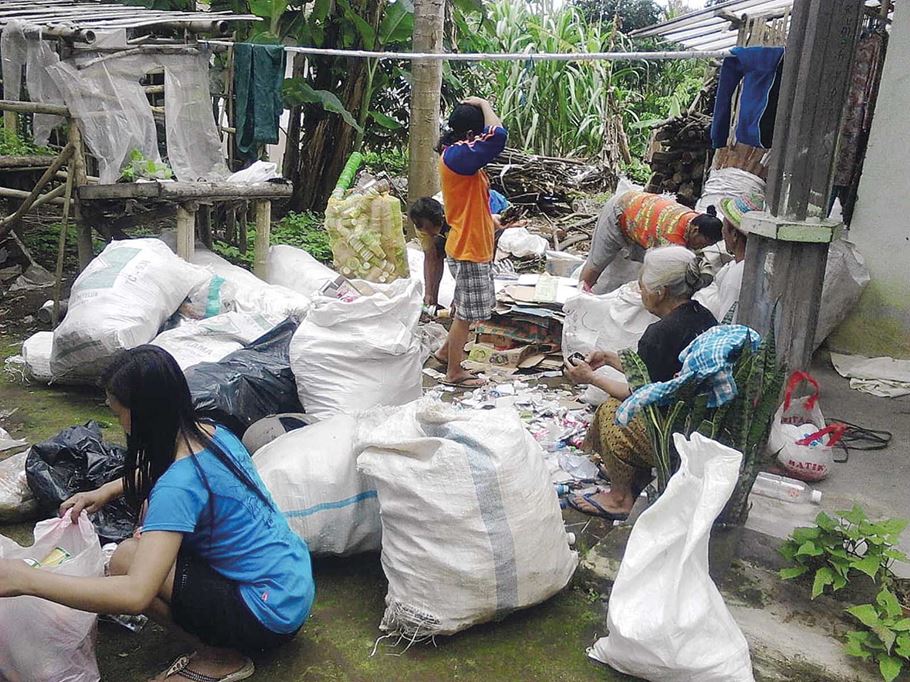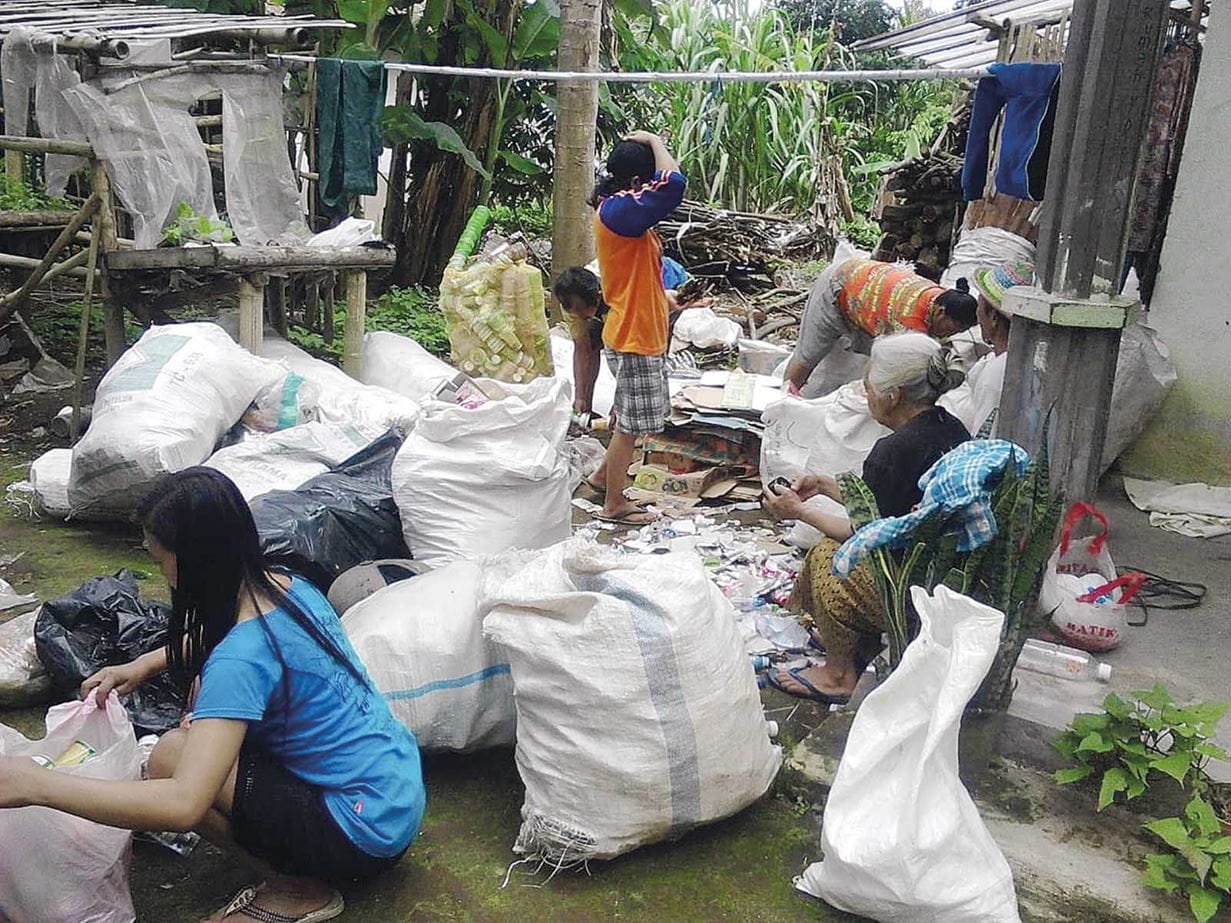We all produce solid waste in our homes, businesses, markets, schools and health centres. Solid waste is anything that we no longer have a use for, and so discard.
Articles
Why talk about waste?
Better waste management can improve public health, provide jobs and protect the environment
Written by Zoë Lenkiewicz 2019 Available in English, French, Portuguese and Spanish

The fumes released from burning plastic waste are very harmful for people’s health. Photo: Hazel Thompson/Tearfund

From: Waste – Footsteps 107
Practical advice and inspiring stories about dealing with waste in our communities
A wide range of materials are found in solid waste, from plastic bags and vegetable peelings to old shoes and used batteries. Some materials such as vegetable peelings will rot down, but most other types of waste do not. Instead, they accumulate in the environment, polluting land, rivers and the oceans.
Around one in three people in the world do not have their waste managed properly. When municipal government does not provide this service, people have to dispose of their waste themselves. This often means they:
- drop it on the ground
- throw it in a river, drain or dry river bed
- burn it in the yard
- take it to a local informal dump site.
When waste is disposed of in these ways, it causes harm to people, livestock and wildlife. Worryingly, we are producing more and more waste, and by not managing it properly we are causing problems for future generations.
Fortunately, waste management can be very cost-effective and can even generate a profit. Introducing a simple system can provide jobs and improve public health, as well as raising people’s perceptions of a place.
Problems
When different types of waste materials are mixed together they pollute farmland and water courses, attract vermin, increase the spread of disease and produce harmful gases. Waste thrown in rivers, canals and gullies blocks drainage and makes flooding worse. This can lead to the spread of water-borne and mosquito-borne diseases, such as dysentery, cholera and malaria.
Children who grow up without a waste management service suffer the most. They are twice as likely as other children to develop diarrhoea and six times more likely to develop breathing problems, and their physical and mental development is often stunted.
Decisions that we make about our waste at home can have global consequences. Carbon and methane gases given off from waste are contributing to climate change. Dead seabirds and mammals washing ashore with stomachs full of plastic are a sign of what can happen when we fail to manage our waste properly.
Opportunities
The good news is that, if waste is managed properly, it is worth money. By keeping the different waste materials separate, they can be recycled into new products and sold to generate an income.
For example, some plastics can be turned into furniture or construction materials. Woody waste can be turned into a low-smoke cooking fuel. Food waste can be turned into compost to improve soil quality.
With a simple waste management service, the neighbourhood becomes cleaner, children’s health improves, fewer livestock and wild animals get sick, and a range of jobs can be created. Once people understand these benefits, most will pay a small amount of money towards waste management in their community.
The important thing to remember is to keep the materials separate. This is much easier if you can collect waste close to where it is generated – for example, directly from homes or offices. When the materials are all mixed together at the dump site they are very difficult (and quite unpleasant) to work with. But when they are clean and separated, the materials are a good resource for making new products.
As well as making the community cleaner and safer, community waste management brings local economic benefits:
- Anyone, including local youth, women and marginalised groups can organise waste collection and reprocessing activities, creating jobs and generating income.
- New products made locally from waste can be used instead of expensive alternatives.
- A stronger, healthier community is better able to continue with their daily work.
People do not need large machinery or expensive vehicles to manage their waste. There are plenty of no-cost or low-cost ways that communities can recover the value from waste materials.
Changing hearts and minds
It is quite common for people to look down on those who work with waste. But in fact, these people are environmental heroes. They are providing a very valuable service, preventing pollution, protecting public health and generating their own income.
To work in waste management and recycling is something to be proud of. We encourage everyone to talk to their community about the benefits of working together to support a local waste and recycling system.
What can I do about waste?
We can all make an impact on the amount of waste in our community. Remember: Reduce, Re-use, Recycle.
- We can start by reducing how much we consume. We can refuse unnecessary plastic bags and single-use disposable products. Reducing the amount of waste that needs managing is the cheapest way to address the problem.
- Re-using items also reduces waste. For example, a plastic bag can be used many times, extending its useful life from minutes to years.
- Waste materials that are unavoidable can often be recycled into new products.
- DO NOT BURN PLASTICS. When plastic is burned it releases harmful gases that can make people very ill.
- Speak to your local government and ask what their plans are for waste management in your community. Find out what your national government is doing to improve waste management.
- Here are some tips on advocating about waste.
Case study: Changing lives through waste in Indonesia
A church in Ngelo, Indonesia, has decided to do something about the waste in its community – with amazing results.


Photo: Mesakh Riwanto/Yayasan Sion Salatiga
In 2013, local NGO Yayasan Sion introduced the Ngelo congregation to the church and community mobilisation process (CCM). This approach encourages churches to work together with their community to solve the problems they face. They decided that their biggest problem was waste, so the church decided to start a rubbish bank.
They appointed administrators and decided on some rules. Members of the scheme could bring their non-organic waste to the rubbish bank regularly. For the elderly or those living far away, volunteers would collect their waste from their homes. The team decided to pay people for their waste, with different prices for different materials – for example, 2,000 rupiah (0.14 USD) per kilo for iron.
After collecting the waste, the team separates it according to how it can be used. Some is sold on to waste collectors. Other materials are made into handicrafts such as purses, bags and lamps, which can be sold in the market. The team then takes the remaining waste to the final rubbish dump, 15km away.
From the beginning, the community felt very positive about the project, because it enabled them to use their waste as a source of income. Poor families are now able to pay the school fees for their children. For the church, the garbage bank is a starting point for building relationships with the community. More than 50 people from outside the church have already joined the scheme.
Web: www.yasiga.org
Knotty problem
Question: If open dump sites are so unhealthy, should we be working to simply close them down?
Answer: Often, when the world’s attention turns to an open dump, the government responds by closing it and the journalists go home. All that happens is another open dump emerges nearby, and those who scavenge from the waste move to the new site.
The problem is that if there is no alternative solution in place, people will discard their waste in the only ways available – dumping it or burning it. And the waste pickers will follow the waste.
Replacing an open dump with a government-controlled waste management system is not an automatic solution, either. The losers, again, are the hundreds of men, women and children who make their living by scavenging from the dump. If you take that opportunity to earn a small living away from the poorest people in society, they will starve. Solutions need to be inclusive.
To close dump sites, you need to have a workable alternative solution in place. You need to have regular waste collection taking place, and you need somewhere to take it. One idea is to build resource recovery facilities alongside existing open dumps. Informal waste pickers who are currently working in dangerous conditions on the dump site can gain employment (or better still, form a cooperative) sorting recyclable materials and reducing the amount of real ‘waste’ that needs to be disposed of.
There will always be something left, though. The fact is that in most cases, a standard, lined landfill site with landfill gas capture is still the most appropriate answer for non-recyclable waste. (That is, until we stop producing waste, or learn how to make it disappear!)
Answer provided by Zoë Lenkiewicz.
View or download this resource
Get this resource
Get this resource
Written by

Written by Zoë Lenkiewicz
Zoë Lenkiewicz is Head of Communications at WasteAid, a charity helping communities to develop low-cost solutions to their waste problems. Web: www.wasteaid.org.uk Email: [email protected]
Similarly Tagged Content
Share this resource
If you found this resource useful, please share it with others so they can benefit too.

Subscribe to Footsteps magazine
A free digital and print magazine for community development workers. Covering a diverse range of topics, it is published three times a year.
Sign up now - Subscribe to Footsteps magazine





